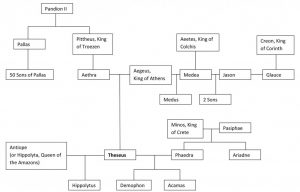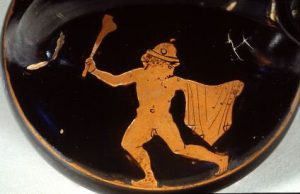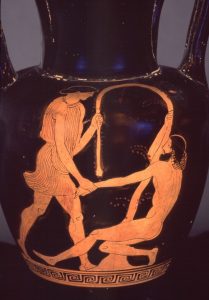Θησεὺς δὲ γεννηθεὶς ἐξ Αἴθρας Αἰγεῖ παῖς, ὡς ἐγένετο τέλειος, ἀπωσάμενος τὴν πέτραν τὰ πέδιλα καὶ τὴν μάχαιραν ἀναιρεῖται, καὶ πεζὸς ἠπείγετο εἰς τὰς Ἀθήνας. φρουρουμένην δὲ ὑπὸ ἀνδρῶν κακούργων τὴν ὁδὸν ἡμέρωσε. πρῶτον μὲν γὰρ Περιφήτην τὸν Ἡφαίστου καὶ Ἀντικλείας, ὃς ἀπὸ τῆς κορύνης ἣν ἐφόρει κορυνήτης ἐπεκαλεῖτο, ἔκτεινεν ἐν Ἐπιδαύρῳ. πόδας δὲ ἀσθενεῖς ἔχων οὗτος ἐφόρει κορύνην σιδηρᾶν, δι᾽ ἧς τοὺς παριόντας ἔκτεινε. ταύτην ἀφελόμενος Θησεὺς ἐφόρει. [2] δεύτερον δὲ κτείνει Σίνιν τὸν Πολυπήμονος καὶ Συλέας τῆς Κορίνθου. οὗτος πιτυοκάμπτης ἐπεκαλεῖτο: οἰκῶν γὰρ τὸν Κορινθίων ἰσθμὸν ἠνάγκαζε τοὺς παριόντας πίτυς κάμπτοντας ἀνέχεσθαι: οἱ δὲ διὰ τὴν ἀσθένειαν οὐκ ἠδύναντο, καὶ ὑπὸ τῶν δένδρων ἀναρριπτούμενοι πανωλέθρως ἀπώλλυντο. τούτῳ τῷ τρόπῳ καὶ Θησεὺς Σίνιν ἀπέκτεινεν.
- Map
- Pre Reading
- Post Reading
- Culture Essay
This excerpt (Library 3.16.1-2; Epitome 1.1-4), recounting Theseus’ six labors on his journey from Troezen to Athens, falls in the midst of the Library’s discussion of the kings of Athens and Athenian-Cretan stories surrounding Theseus and the Minotaur. Childless and without an heir, Theseus’ father Aegeus sought advice from the Delphic oracle, who answered him, saying “Loose not the bulging mouth of the wineskin until reaching the height of Athens.” On his return to Athens, Aegeus stops at Troezen where the king Pittheus, understanding the oracle, makes Aegeus drunk and makes him sleep with his daughter Aethra. On the very same night, Poseidon also slept with her. And as Aegeus departs, he tells Aethra that he has left a sword and sandals under a heavy rock, and when the boy is strong enough to roll away the rock, she should send him to Athens.
This story is typical of the Library, telling the story in such a way as to focus on the hero. It is so compressed that it leaves out key details, such as the meaning of the oracle or why Theseus is visiting Troezen on his way from Delphi or why Aethra sleeps with both a god and a human on the same night that she conceives Theseus. Nor does this telling of the tale show any acknowledgment of Aethra’s perspective and how she might have felt that fateful night. So who do you think is the primary audience of this tale?
Read the culture essay, “The Labors of Theseus.”
Vocabulary: Theseus-Pre-reading-Words of strength
Watch the Ancient Greek Review video on the Past Tenses in Greek – Imperfect and Aorist
Complete the Practice exercises on the aorist and imperfect.
Although Apollodorus does not explicitly mention it, Theseus was raised by his mother Aethra in Troezen. Look up Troezen in the Oxford Classical Dictionary or similar resource. What connection does Troezen have with Athens? Why would it make sense to link Theseus with Troezen and Athens?
[pods name=”culture_essay” slug=”414″ field=”post_title”]
[pods name=”culture_essay” slug=”414″ field=”essay_excerpt”]


Photograph by Maria Daniels, courtesy of The University Museum, University of Pennsylvania, October 1991. Philadelphia L-64-191.

Photograph by Maria Daniels, courtesy of Harvard University Art Museums, 1990. Harvard 1927.148